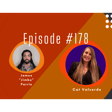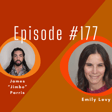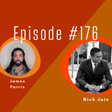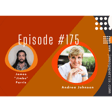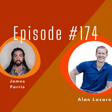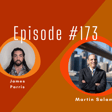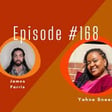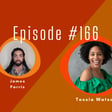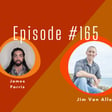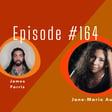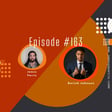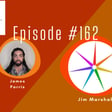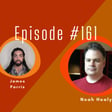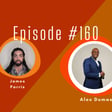Introduction of Dr. Amy Alexander
00:00:02
Speaker
All right, hello everyone. Welcome back to the show. We have Dr. Amy Alexander here. She is the founder and CEO of Legacy Consulting. And yeah, let's get this started. So can you give me a brief gist or a brief summary of who you are, what you're about, and what your message is overall?
00:00:24
Speaker
Yes, good morning and thank you so much for having me. So I
Background in Public Education and Mental Health
00:00:29
Speaker
am a veteran of public school. I worked in public education for about 30 years. I left that space last year around this time.
00:00:43
Speaker
I was an eighth grade US history teacher for almost a decade. I was a elementary school counselor for a few years, and I spent the majority of my time in that space as a high school counselor. As well, I worked in mental health as a clinician. I worked with adjudicated minors doing individual and group therapy, psycho-educational groups with them. And also, I worked at a local
00:01:12
Speaker
walk-in crisis center, which was very eye-opening. It gave me a
Early Work in Trauma and Communities of Color
00:01:18
Speaker
very different perspective of the mental health world, how to access services, and the obstacles that exist in getting people the help that they need. I've also worked a lot in the space of trauma
00:01:36
Speaker
kind of before everybody was a trauma expert in the last like, I don't know, seven to 10 years. I've been looking into trauma for the last probably 16, 18 years, particularly as it relates to communities of color and specifically to the Black population.
00:01:57
Speaker
When I started, there was hardly any literature, any research on trauma in the Black community. And we're talking about generational trauma, trauma that's passed on through family, through culture, collective trauma. So that
Founding and Impact of Legacy Consulting Post-COVID
00:02:16
Speaker
is a space in which I operate some things around secondary trauma.
00:02:22
Speaker
There was a lot more literature on survivors, second and third generation survivors of the Jewish Holocaust, as well as more information even in regards to the indigenous population with the Holocaust on indigenous peoples. And as well, I used information on sexual assault survivors. There was information and research on that that I used to kind of piece together
00:02:52
Speaker
um, my research regarding trauma in the black community. Um, I've since, uh, you know, started my, my company legacy, uh, maybe about three years ago. And I've been fortunate enough to be in spaces with educators, with nonprofit workers and staff, with business people, um, post, you know, uh, COVID-19. And it is just, uh, overwhelming the
00:03:23
Speaker
I'm an energy person and the energy of these folks who are really suffering. I think COVID brought a lot of mental health issues that we were kind of ignoring and thinking we could just push through on our own to the surface. And now a lot of folks don't know how to deal with
00:03:45
Speaker
this trauma with the anxiety, with the depression that they're experiencing. So
Personal Experiences with Race and Identity
00:03:51
Speaker
it's really moving and it's actually encouraging and gives me energy to be able to go into spaces and let people know that it's okay, that this is normal, that they're not defective, right? That they're not, as some people say in past generations, crazy, that they are human and that these feelings
00:04:14
Speaker
that they're experiencing these thoughts that they're having are human things. So it is a blessing to be able to kind of provide people relief in that space. And I enjoy that. So what got you introduced to trauma? And what got you first interested in learning about trauma and kind of
00:04:45
Speaker
begin to develop approaches or begin to push in the direction of actually helping people who deal with trauma and to learn about generational trauma.
00:04:56
Speaker
Well, let me say this. I saw a quote. I'm very into mindfulness. You know, when I do workshops, I have people just kind of settle into their space and kind of try to push away the stressors and the things of the day that we bring with us. And I read a quote that said, we're not human beings having a spiritual experience.
00:05:17
Speaker
spiritual beings having a human experience. I think to answer your question, my interest in history and my years as a history teacher and my fascination with just kind of how people behave right in certain spaces and certain times brought me to the idea of trauma.
00:05:38
Speaker
In addition to my own personal experiences, I identify as a black woman. I was raised by a white woman who is my mother. She's since passed. But I saw, I lived the experience, I'm 55, I'm gonna be 56 next month. And sometimes people think that these things that happened in terms of race and discrimination are so,
00:06:05
Speaker
so far in the past, but they're really not.
Critique of the Education System
00:06:09
Speaker
My mother was a white woman having a black child in the 1960s. She was spat on, prohibited from entering certain places and spaces like a local amusement park had a swimming pool. And when the
00:06:24
Speaker
Segregation laws, when they were forced to desegregate, they closed the pool. They just shut it down, put other rides there. My mother, in her defiant space as a probably 25-year-old woman, took her black child, me, into that pool. So she said, we're going in there. And as you can see, some people might not see my blackness.
00:06:49
Speaker
But things like that, things like people asking my mother and me, did I get my job because of affirmative action, as if my qualifications and my abilities weren't enough to earn me a place.
00:07:04
Speaker
in a professional space. Things like being underestimated. Things like seeing my students underestimated and not being encouraged to take the more rigorous academic courses, to not be permitted by some type of gatekeeping to challenge themselves
00:07:25
Speaker
in those spaces where they were probably very capable, but just not given the space and the encouragement to do so. I mean, there's so many things that cause trauma going into schools. And this is one of the reasons why I had to leave. I do not agree with policing children. I do not agree with policing children in spaces that they are
00:07:47
Speaker
required by law to be in, such as school. When they come in, they're yelled at to turn their phones over, take their hoods off, walking through metal detectors, having their personal effects searched as they enter this space. This is not education. This is indoctrination. This is control. And so all these things have kind of helped me to see
00:08:17
Speaker
That there's a connection when people say, well, why is everything about race or why can't you all you people let go of the past like slavery was hundreds of years ago, but slavery, what happened then has been passed on those reactions to what happened to so many of our ancestors, the torture, the disrespect.
00:08:38
Speaker
the inhumanity of how they lived and existed has been passed on because the fears, the reactions to those things, when women, black women saw their men being mutilated and beaten
00:08:53
Speaker
and even murdered in some cases, that reaction to seeing that means we're now going to try to protect our men because we've seen the horrors of what can happen if we don't. And so that doesn't change. That, in fact, when it's unaddressed and not even acknowledged, it becomes more a part of our culture, more embedded in who we are, so much so to the point that we think it's normal.
00:09:21
Speaker
And it being the things that we, for instance, let's talk about a little bit risk and protective factors. A protective factor during the days of enslavement is keeping your mouth shut, not talking to people about, you know, possible plans to escape or
00:09:41
Speaker
or what have you amongst black folks. Today, we kind of are closed mouth about the things that we need to be expressing and we need to explore because no, I'm good. I can handle it. I can take care of it. I don't need to share my business with a stranger who's paid to listen to my problems. So now it's a risk factor because we are not
00:10:03
Speaker
addressing the things that we need to address collectively, culturally, historically, in order to be able to start the healing process.
Educational Journey and Overcoming Stereotypes
00:10:13
Speaker
Now, you're so right about that, you know, because I see this all the time a lot in the academic environments, too. You know,
00:10:21
Speaker
I usually am one of the only black people there that asks for extra help from the professors and the teachers and opens up about problems. And I always wondered why other people didn't do it. And your explanation, it definitely helps to emphasize it's sad. I mean, it definitely needs to change, but to kind of move this forward,
00:10:44
Speaker
How do you think generational trauma has maybe influenced your life or your legacy? And again, mind you, if you have a family or anything else, kids, I'm not sure. Wow, that's that's powerful. That's a powerful question. I think it's hopefully made me more sensitive to other people's experiences, even the ones that I haven't had. And I think
00:11:15
Speaker
My work, and when I say my work, I mean not my research, not the academic piece, but the everyday work of hearing, and I call my students my babies, hearing my babies' stories, the things that they've endured, the things that they've overcome.
00:11:35
Speaker
you know, parents working through addiction, parents who are incarcerated, walking through violence, you know, to get to school, to get home. I've had students who were shot on their way to school. I've had, or, you know, how they come back from that moves me. It makes me wonder how the human spirit, how people, especially Black folks, have such
00:12:05
Speaker
power to overcome. And I've had students who are living in poverty of all races, white, black, who are living with addicted parents, who are living with just
00:12:22
Speaker
situations and circumstances that I do not know how they have managed to get to the place where they're at. And that has moved me. Seeing my mom struggle, seeing my mom rejected from spaces when I was a little child because
Mission and Philosophy of Legacy Consulting
00:12:40
Speaker
she opted to have a Black child.
00:12:46
Speaker
And to stand firm on that, even when her family members rejected her, they said, you can come, but don't bring that black baby. And my mother, to family events and things like that, she said, no. If I can't bring my child, then I'm not going to be in those spaces. I think there's such a myriad of things, even my own life,
00:13:13
Speaker
as a student, all the way from, I was so happy and proud. I remember being in fourth grade and I read to the level to be in the highest reading group. Now, when I look back at that as an adult, yeah, that was great for me, but what about the other students? What about that there could have been preconceived ideas about their abilities? Why are you in the low reading group? Why are there even distinctions in that? And that's something that bothers me about public education.
00:13:40
Speaker
The division, you know the kind of tracking like you're good enough to be here and you're not And that followed me even through my my doctoral studies. I was looking around thinking, you know that imposter syndrome Like why am I here? I'm not smart like these other people and I am and it turns out that I might actually be more intelligent and To have my students kind of walk
00:14:08
Speaker
with me through that journey and see the parallels, right, of what they're experiencing in high school and what I'm experiencing as a doctoral student, as a Black woman. Those things stay with me and they make me want to be better and they make me want to try to understand why education, why the systems in this country
00:14:31
Speaker
are not willing to change. And I understand that. I understand that the majority wants to hold on to power, that people don't want to change. People want things to be status quo. And that holds a great percentage of people in this nation back. And yes, we can point to people like you. We can point to people like me. We can point to people like President Obama and Henry Louis Gates and all these successful Black folks. But those were pretty much outliers because the system was not set up for us.
00:15:01
Speaker
to succeed. The system was set up for us to be in the background. And I aim, honestly, to change that because I've been wounded and I've seen other people who have been wounded and who might not reach their potential because no one is there to tell them
00:15:24
Speaker
that they don't have to live in that space. They don't have to live down to the expectations of others. And I just think that's important. I think all those things can be traumatic. And that's the insidious nature of trauma, right? Is I can go through something a similar or same situation that somebody else goes through and I can be traumatized by that and the other person might not be.
00:15:49
Speaker
It depends on our lived experiences, on our systems of support, right, on our character, on how we see ourselves. Those protective factors that we employ to kind of help us work through trauma. So I think there's just so many things to learn about it. It's fascinating to me. Humanity is fascinating to me. And history plays a part in that as well.
00:16:19
Speaker
You know, you raised a lot of good points there. I think this is when we begin to talk about you. So what was your life like when you first got into college, when you were pursuing your education? What was your goal regarding internships? What was the game plan when you came out? What was the attack plan on finally
00:16:48
Speaker
going against this generational trauma and beginning to create better access and availability to the majority of Blacks in America? Well, I think it started way before I was conscious of it. All the things that I've just mentioned to you, and there's myriad examples I can give you, being disinvited to birthday parties when people's families found out I was Black.
00:17:16
Speaker
not being able to participate in certain things, being shunned. I was being prepared, I think, unbeknownst to me,
00:17:26
Speaker
For those moments, I had the power in certain spaces to speak up for others, to speak up for my students. So I don't know that there was a moment. I don't know that there was one thing, an event, right, that set me in that space. But a life of living got me to that point of observing, of being curious.
00:17:56
Speaker
And I remember saying to my dissertation chair, a great woman, a great scholar in trauma, Dr. Lisa Lopez Levers, that I'm just I don't think I'm as smart. I'm not, you know, as these other folks here. And she said, Amy, you're curious. And
Influence of Upbringing on Race and Identity
00:18:14
Speaker
that is a level of intellectual
00:18:18
Speaker
capacity that you want to know. And I discovered that when I got into my doctoral program, I was like, research. And I'm like, ooh, who likes to do that? In my head, it was like sitting alone in a space by yourself, kind of just walking through different results of statistical evidence and data and things like that. But research is fascinating. That's how I find out things. That's how I come to understand myself.
00:18:48
Speaker
I think when I got to be a counselor, even as a classroom teacher, I saw disparities. I saw who was able to get into the early language, you know, world language courses and language was tied to math and math was tied to English. Like if you could get into this class, then you could be in honors English and you could be in advanced geometry and you could be
00:19:12
Speaker
And so what were I might be good in English and I might not be good in math Why can't I be in the advanced English and you know and and kind of honed my strengths rather than being penalized For not being good in everything Considering that black folks started from behind the finish line. I mean behind the start line, right? Progress is is
00:19:37
Speaker
different groups and individuals. We can't expect people who started on third base to advance at the same pace as somebody who started on first base. Somebody who gets to second base and maybe started on first base is making advances, right? They might not be on third base like the person that they're in that space with. And I think we judge folks in that way.
00:20:08
Speaker
If I get a C on a test, that's good for me. I'm not good in trigonometry. Um, I know people that are, and so they get a minus and they're disappointed in that. Um, but I think a lot of folks of color, a lot of folks that come from poverty, regardless of race are not given those opportunities. And I don't think that's fair.
00:20:33
Speaker
I think that that's not what America projects itself to be, what it's declared itself to be. And I think we just sit in systems that were developed hundreds of years ago because it's comfortable, because it gives the same people the power.
00:20:51
Speaker
Most systems don't want to be disrupted. I go into nonprofits, even in schools and corporations or businesses, and they welcome me. And yes, we want to know about trauma-engaged interventions and pedagogy and things like that. But maybe they just want to fulfill a mandate by a system that's regulating them. I don't know that there's sincere desire to change.
00:21:16
Speaker
I have a sincere desire to change systems. And so I do that the ways that I am capable of. And again, going back to, I know I'm long winded, I'm sorry. Going back to your question, I think I've been preparing for a lifetime to move into this space to build my own kind of courage and
00:21:42
Speaker
determination and my recognition of my own power that I can speak up for myself and for other people. So I think, honestly, to the doctorate, that doctor in front of my name gives me more credit, if you will, in some circles. So I have the space to be able to say
00:22:02
Speaker
This is wrong. And we're thinking in wrong terms, yelling and screaming at students, wanting them to not explore their creativity and their individuality is not education. It's indoctrination. We're not doing them any favors. And again, that's why I could no longer stay in that space because I saw a system that was harmful to the people that I desire to help. And I feel like I can do different things outside of that system in order to advance those ways of thinking.
00:22:32
Speaker
than I could inside of it, to be honest. Also, then you know, I think the next question I have now is, where do you think that deep curiosity within you came from? Were there any things you did as a child that may have helped to foster that curiosity? Did your mother ever do anything with you? Do you remember doing anything ever to foster that?
00:23:04
Speaker
Yes. Wow. You're really great at this. You're making me dig deep. My mother did. She was 21. Well, she was 20 when she had me. I was born in April, but she turned 21 in May. So a young woman, right?
00:23:21
Speaker
An adult, yes, but still young in that space. And for that, I think she did amazing things. She took me to museums. She read to me. She took me to the library. I remember getting my first library card. In fact, I even saved my daughters. I have two daughters and they're adults, but their library cards, when they get to write their own name on the little library card,
00:23:45
Speaker
My mom told me, Amy, you can know anything that anybody else in this world knows if you have a library card and you can access those things. This is way before computers and things like that.
00:24:00
Speaker
So she did those things. She also, I remember her telling me, because I said, nobody likes me and everybody hates me. And, you know, I'm like, I don't know, six or seven years old. And my mom saying that, Amy, that is a cognitive distortion. So I'm like, mom, I'm six or seven. I have no idea what you're talking about.
00:24:20
Speaker
but just saying all and every and no one and nothing really are not accurate. So I think she had a lot to do with my level of curiosity and my just way of thinking about people and humans. I was born
00:24:38
Speaker
I guess what people call today an empath. I remember, so we were poor, right? But I was always trying to help other people. I remember seeing people walking, you know, like in the rain or snow or at night. And I, you know, asked my mom to stop and pick them up. And she's like, you know, I have an obligation to protect you and us. So I cannot just pick up strangers and things, but just
00:25:01
Speaker
having that empathy for other human beings, which I remember also being told that might hurt me in some ways because people are not always good and don't always have good intentions and don't always receive love and kindness the ways that we hope they would with graciousness and appreciation. Sometimes they use that against you and manipulate and things like that. But, uh,
00:25:31
Speaker
she did try to try to give me a rounded experience and I remember saying to her when I got older that you know you never really taught me about my black heritage or you know where I come from and and she she accepted that she said Amy you're right I I never did um not not
00:25:51
Speaker
intentionally or consciously, I put you in spaces where there were Black women. But she said, I also never taught you about your Irish history or any of that either. So there was that. She didn't do that for any of my background. And I think that too, just
00:26:10
Speaker
having to kind of navigate people asking me, well, what are you? And that was a question that I had my entire life. And as a child, I didn't even understand what people were saying. So that made me curious. Like, what are you talking about? What am I? I'm human. And I discovered that
00:26:28
Speaker
My mom wanted me. She would say, Amy, you're just you. You're a human being. But that's not the way the world saw me. That's not the way the world categorized me. And I had to come to terms with that. And I had to try to help her understand that. That I can't
Philosophy of Leaving a Positive Legacy
00:26:41
Speaker
move like just Amy, because that's not going to be accepted in this world that's really based on color.
00:26:48
Speaker
and gender and a whole bunch of other things like, you know, spiritual beliefs and ethnicity and sexual orientation and gender identity. I had to be a Black woman. And I love being that. I wouldn't want to be anything else. But I think having to move
00:27:08
Speaker
and navigate those spaces that other people created and also not being limited to their idea of who I should be moved me and made me think differently. I know I think differently than a lot of people my age regarding social issues and things like that. I would say I'm extremely liberal according to people, but I interpret that as being,
00:27:37
Speaker
kind of in love with humanity wherever I find people, wherever they're at, because I want that grace. And I'm still growing at almost 56 years old. In fact, I'm able for the first time
00:27:51
Speaker
to kind of look at who I am because I had my daughter so young. I say I went from being my mother's daughter to being my daughter's mother with no room in between at 21 years of age to kind of see who I was and explore really what I thought outside of being in those roles, right? My mother was at the time she grew to be a conservative person coming from a very liberal space in her youth
00:28:21
Speaker
Um, so I had to navigate those things and really try to figure out what I truly believe. Um, and my daughters have also helped me with that. People think that I'm very, um, kind of sister soldier, you know, very, you know, just supporting causes that I believe in. Um, but my daughters are probably even more so that, um, and, and then they teach me a lot and, uh,
00:28:48
Speaker
So listening to people also that we might not believe have anything to teach us, I don't think there's a human being in this world that doesn't have something to teach me. I don't think that I'm always the teacher. I'm willing to learn from anyone. And I think sometimes that gets lost in kind of the hierarchy of society and of education that, well, you're just a freshman or you're just an undergraduate or you're just a high school student or you're just a person who doesn't have a degree.
00:29:18
Speaker
No, you're equal to me in humanity, right? When I was in the school system, I relied a lot on bus drivers, particularly in the elementary space. I relied on food service workers and custodians and security officers because they were in the hallways and spaces that I wasn't in, and they would share, oh, I saw so-and-so going into the bathroom with somebody else, or I saw so-and-so in the corner.
00:29:46
Speaker
you know, crying or whatever. And these, so they were equally as significant in that space as I was though, when people walked in, they saw school counselor Dr. Alexander and think that, you know, I'm somehow better than these other folks or more significant to the system and I wasn't and I'm not. So I think that's something that I hope to never lose, that I can get knowledge and I can learn from anyone.
00:30:13
Speaker
And I think that moves me also in these spaces of curiosity, because everybody has a story to tell. And we just have to be willing to listen, really. So let's sort of move on to legacy consulting. What story do you think legacy consulting has to tell?
00:30:34
Speaker
Well, I really didn't think of myself as a businesswoman. To be honest, I was an assistant. And here in the north, in the northeast, I guess, because I know educators in the south and other areas, other regions, are not as fortunate as I am to have been in a union. Very strong union culture here. I'm in Pittsburgh, Pennsylvania. So union is like life here.
00:31:01
Speaker
And being in that system where I was kind of collectively protected in some ways didn't afford me the opportunity or the need to kind of think outside of the system until, again, my last few years. So legacy comes from
00:31:21
Speaker
First of all, the title of my dissertation, which is long, but it starts out with examining the legacy of transgenerational trauma. And I was looking for a name for my company. I thought legacy, legacy, what do I want to leave in this world?
00:31:39
Speaker
when I'm gone, when I'm no longer here, and that is a legacy. The double A, because I have two capital A's in the middle of legacy, and that's the difference of, I guess, my company, like the name, came from one of my former students who I had my first year as a history teacher, LaShawn Renee Murray. She said, I like the double, like, why don't you make it two double A's in the middle to make it kind of distinct? And so that's where that came from. But also just what I've gotten
00:32:07
Speaker
from the people that I've encountered, the women. There was a lot of single women in my neighborhood growing up just seeing how they struggled, how they managed, how they were disrespected and disregarded in a lot of ways to wanting something different for myself and for my daughters and for my students to make the world a better place. And I know that sounds trite, but my space in this world
00:32:37
Speaker
Whether I touch millions of people or tens of people, I want to leave them better or maybe more self-sufficient and more self-aware, let me put it that way, than when I entered their space. So legacy is a journey for me, an attempt to help comfort people in their spaces, but also
00:33:06
Speaker
in that comfort and in that knowledge, help to move them forward to be able to fulfill their purpose and to help and educate others while doing that, to face kind of a love and a motivation to be greater.
00:33:34
Speaker
Yeah, and to bring others with us as we move in that space because no one can do it alone. I don't care how smart you are, how wealthy you are, how much power you have, we all need each other. And I think sometimes the American spirit of that individual ruggedness and pushing on and
Significance of Tattoos and Heritage
00:33:58
Speaker
kind of sometimes gets in the way of us understanding that we all need help and accepting other people's help where we want to go, all of us. It's not like just me. It's not just you. It's not just somebody else. It's all of us pushing forward together. Well, that's true. And I would say too that
00:34:25
Speaker
It's that aspect of working together that really leads to the success of a lot of people that term standing on the shoulders of giants. That doesn't come from, you know, just doing things on your own. So I completely agree with that.
00:34:43
Speaker
And again, forgive me if this might be a bit of a, this is probably an odd question I'm going to ask though, but I noticed you have some tattoos. I like the tattoos quite a bit. And what significance do you think those tattoos have on your life and what, you know, what meanings do you think, well, the most important ones?
00:35:04
Speaker
Well, I have on my hip a tattoo of Africa, the continent. I did do this DNA thing. I know some spaces of where my ancestors came from on the continent, but that's obviously significant to me because of the kind of disregard
00:35:28
Speaker
in terms of the greater society and history of the African diaspora and how black folks got here, where we come from, our language, our cultures, our tribes that our ancestors were in. That's really significant and important to me. I also have, and you can't see it, but I have a tree kind of on my chest, and it's a woman.
00:35:53
Speaker
that the tree trunk is a woman, which represents me. The leaves coming out from the top have my daughter's names in them. And then I went back and got the roots and they're on my stomach and the roots have the names of the people that the women that are significant to me in my life.
00:36:11
Speaker
that have passed, including my mother and my aunt. Both of them died of breast cancer a number of years ago. My grandmother, obviously. And then other women, Sojourner Truth, Fannie Lou Hamer, forgive me if I, Coretta Scott King, Maya Angelou. I mean, so many women. I wish Shirley Chisholm,
00:36:40
Speaker
I'm trying to think of, I said Fannie Lou Hamer. I can't think of the woman now, of course Harriet Tubman, Phyllis Wheatley, the lynching woman. Ah, that's terrible. Ida B. Wells Barnett. And I can't even think of all, but the roots are those women because Dr. Betty Shabazz, I've never met them, any of them, but they have had some influence in my space because
00:37:07
Speaker
of the hard work that they did, of their willingness to share their journey and their knowledge. So I'd say those are extremely significant. I have a tattoo here on my hand.
00:37:22
Speaker
That's Aries. I think I've grown to, I was raised like, oh, don't do that. That's the devil's, you know, that's of the devil. And I'm talking about astrology. And I've come to understand that there are useful things in astrology that around humanity, like we have certain things in common, depending on the zodiac sign under which we were born. And Aries is the first of those. And it's a fire sign and it represents
00:37:50
Speaker
kind of where I started because it's almost opposite being born to a poor white single mom in the 1960s in a space where they put her out of the hospital. They threatened to if she didn't pay her bills. Um, just be kind of like almost opposite of what my birth sign is.
00:38:13
Speaker
and to be able to grow into that. And I think that's a lot of people's experience. We have, there's like opposing forces, right? That we are trying to navigate and figure out internally. And I believe that's true of every black person because we are Americans.
00:38:32
Speaker
But we are like James Baldwin, my favorite author. We are Americans, but we don't get to understand truly what it's like. We live in America, but to be an American, to be accepted in that space wholly and fully is still a dream. We're still working towards that.
00:38:51
Speaker
Um, so the tattoos are, are really personal and I know people look and say, well, why would you do that to your body? Um, I think of it as art. I think of it as things that I can carry with me where I don't need like a wall to put it on or to go to a space of a museum, um, to be able to see it and experience it. And I just, you know, I'll probably be getting tatted, you know, until, until I leave this earth, because there's so many more experiences and so many things I want to put on me.
00:39:21
Speaker
And actually, let me show you. I just got this one not too long ago. As you can see, it's the name of my company with the legacy. Yes.
00:39:28
Speaker
And I just, yeah, I just love the artistry of the tattoo artist. And they take that, at least the ones I've experienced very seriously. And it's just, they're moving in their creativity and in their space. And then I just, you know, I really just love the whole process of figuring out what I want to put on my body and where I want to put it and the significance. So any day I can go in the mirror and say, or look at my arm, like I did this, the little girl,
00:39:59
Speaker
born of a poor single mom who was spat on, who wasn't given a chance to even graduate from high school. A lot of people thought I wasn't even going to graduate from high school to be here in this space. I can be proud of that. And I can be proud of that with the people who have helped me, which includes my students and their parents, my family members, my daughters, people like you, and just recognizing
00:40:27
Speaker
the gifts that I have because I didn't for a long time, you know? I noticed from that arm tattoo, the A's, they look a bit different. You put eyes and tweens and add to it. Interesting. They are the eyes of Haru. Um, and if, and I, I could show you this other tattoo, it'll be upside down because it's, let me see how I can get that to you. Um,
00:40:56
Speaker
You see it? Yes, but there's a lot of African symbolism is there. Let me turn that around. And there's a scarab beetle in the Eye of Heru. That's what's in my
00:41:11
Speaker
I have like four logos for legacy so I had to choose which one I wanted and I might get the other ones on me at some point but they're all representative of kind of spiritual existence and based in African culture. I couldn't tell you the specific country out of the 54 countries in Africa that these come from and maybe it's multiple ones but that is yes that is that is what it's and that's and again that that that heritage is in all the
00:41:40
Speaker
the logos of legacy. So yes, significant in that way. And it also strikes up conversations with people who might be genuinely curious about things that they haven't been taught. So I get the opportunity to say, yes, this is like an African symbol of spirituality and of peace and love of humanity. And so
00:42:03
Speaker
It's cool. It does a lot of things outside of just being art on my body. And I almost say just, because that's really significant as well, of being art on my body. It helps spark conversation and build relationships and spread knowledge. So you talked a bit
Navigating Racial Identity in Diverse Spaces
00:42:22
Speaker
about your Irish. Well, I don't know too much about the Irish heritage, but you have a very interesting mix of cultures.
00:42:33
Speaker
When you first started to maybe get into meeting lots of Black women, I think you were talking about your experiences with white people, but when you first were introduced to more Black people, perhaps in Pennsylvania, was it a culture shift? Was it different? It must have been better to some people, right?
00:42:55
Speaker
Well, there were black people. My mom and her sisters were raised in a part of Pittsburgh called the Hill District. And it's pretty famous, actually. Lena Horne had moved here for a while. A lot of the jazz folks would come here. And Lena Horne, I think, is the one who dubbed a space in the Hill District the crossroads of the world because there were so many artists and entertainers who
00:43:19
Speaker
came here and even made Pittsburgh their home for a short time period is where my mother came from. Now, not during that time, but after, and it was still very heavily Italian American, Jewish American. I'm also Jewish as well in my heritage, not in my faith. And black folks and some poor white folks who
00:43:42
Speaker
And once they started gentrifying the Hill District, which now there's like PPG Paints Arena there and other things that they built and people had to kind of disperse.
00:43:54
Speaker
Um, and they went to different, different neighborhoods. Um, but my mom was immersed in black culture when I, I didn't believe her when she was younger. She'd tell me me and your, your aunt, Sandy were like two of the only, maybe four white people in our high school. And I looked at after she passed away, you know, I was going through her things and I saw her high school yearbook and I said, Oh my gosh, she wasn't lying. Um, so.
00:44:19
Speaker
She had a knowledge, I think, that most white folks didn't have of Black culture back then. And she was around Black folks, as I said. A lot of her friends were Black people. So I don't know if it was as much of a shock.
00:44:34
Speaker
I think there was some things that I had not experienced as a Black woman coming into that space. But Black folks have generally almost always from my perspective and my experience been accepting of folks in their community, right? When we think of people who, in my mind, maybe have not
00:44:56
Speaker
not indulge so much in their Black heritage, like, let's say, Tiger Woods, identifying as whatever he identifies as, and others. That thing. Black folks still are very accepting and welcoming. And so, yes, there have been some bumps in the road.
00:45:17
Speaker
In terms of, you know, I remember Kathleen Cleaver, the white wife of, you know, the the ancestor Eldridge Cleaver, a very powerful civil rights movement, being in the Black Panther Party saying, you know,
00:45:35
Speaker
light-skinned people were suspect back in the 1960s. Like, if you were light-skinned and then that movement, you know, people looked at you kind of with a side eye, because what are you doing here? Like, how are you benefiting from this? So, and that, again, is trauma, right? Think about the times of antebellum and enslavement when the master and the overseer pit
00:45:55
Speaker
the masters and overseers children who are, you know, part black in a lot of cases against the other folks, the other enslaved people, the house, if you will, versus the field, the grow. Um, so that is a part of our trauma that we continue to try to work through a skin tone and skin color. But yes, moments when like, what do you, you know, why are you here? Um, but it is, it is just in my nature and in my soul and in my spirit and who I am.
00:46:25
Speaker
to be a black woman. Again, I cannot imagine being anything else and nor do I want to. But yes, I think
00:46:37
Speaker
writ large, the Black community has accepted me once they get to know me and understand that process and my experiences. And I also embrace my Irish culture. That will be one of my tattoos. I will have a clover or some representation of my Irish heritage and my Jewish heritage at some point because I embrace those too. They are part of me. They are what make me me. I don't, you know,
00:47:07
Speaker
uh, sacrifice any part of my blackness to embrace those. I am fully all of what I am. Excellent. And you know, I, I definitely agree with that because my grandfather, um, look, I'll say this in the Caribbean, like in Trinidad, there is a lot of things there and it's called colorism. Right. And basically he was very, very dark.
00:47:37
Speaker
And a lot of times when you're very dark, what they do is they'll say, you know, this is a person that would work in the fields. You know, this is a more lower class black person.
00:47:49
Speaker
It really is a shame because you see those types of environments and he climbed up to the top because he learned Russian, he became a biomedical PhD in the University of the West Indies. But it's idiotic because I see this and then I see other people in this same Caribbean culture, they're trying to lighten their skin, you know, purpose. You could spend all this energy and effort getting an education and you're going to spend that same energy lightening your skin.
00:48:19
Speaker
You know, then it's sad. It's sad. It is. That's an acknowledgement to how powerful trauma is because that of course came from
00:48:30
Speaker
the euro based idea of peasants, you know, working out in the fields, right? And so they had darker skin while the people who were wealthy stayed inside and were kind of more that, that, what do they call it? Ivory or, or, or I don't like that, that very kind of pale skin. And that's not only in black culture, that's an Indian culture that's in Hispanic or Latino culture. Um, and it is just pervasive and it's insane. You're right. It's idiotic that we,
00:49:00
Speaker
subject ourselves to those things but that's what drives me crazy among black folks when we say oh you're that's a light you're doing a light skin thing or you're acting real light skin or you're acting dark skin
00:49:11
Speaker
We are perpetuating that slave mentality and that euro-based idea of what beauty, physical beauty and acceptance looks like. And we need to, in my opinion, really move away from that and understand our beauty regardless of the hue of our skin that we are connected. We're all worthy regardless of our skin tone or texture of our hair or eye color or all the things that we kind of
00:49:40
Speaker
place value on. Don't even get me started with the hairstyle. Get started. Go ahead. No, you probably know more about this, but I think it's more interesting with Black women, especially in work environments. They're always encouraged to straighten their hair. And I think there's this misconception that having a certain hairstyle might affect your opportunities. Well, I'm in one of the top universities on the planet pursuing a master's degree.
00:50:10
Speaker
I've worked at General Electric as just a bachelor's major. Look at me. And it's sad when you see black women especially. I've heard some of them have never even seen their natural. They just keep it straight all the time. It looks like that. But I don't know if you went through that because you're biracial.
Ideal Clients and Empowerment Goals
00:50:32
Speaker
I think hair is an important part of every woman. And when you're talking about colorism, I've done workshops on that. The brown paper bag test, the comb test. If this comb can go through your hair without getting caught, then you can be in our group. And again, it's black people versus black people.
00:50:53
Speaker
because of the trauma that was perpetrated on us in earlier times. The nose test where you had to stand against the wall with a shadow and see how big your nose is or your lips in order to enter certain elite black clubs or organizations.
00:51:12
Speaker
And, but yes, I have. And somebody, I remember being in middle school or high school and I said, well, how did you know I was black? It was, I don't remember the rest of the conversation, but the young man said, because of your hair. And I said, oh, okay. And I wear my hair natural today. You know, sometimes it's just out and it's just wild and uncombed and things like that. And I remember a woman when I was an adult saying,
00:51:39
Speaker
something about, you know, having a beautiful face to me, you have a beautiful face. I just don't know about your hair. It was an older white woman. And I did not know how to respond to that. But hair is a big thing. Now I don't go through the same. I've never had a weave. I've never had braids. I've never had like a wig or things like that. But so I don't
00:52:03
Speaker
go through the same things as a lot of black women and other women of color in terms of my hair, but there have been struggles. And I've, in the last several years, accepted my hair, my texture, and I embrace it. It's me. And it's sad for me that it's taken me to my fifties to get there, but yeah, there has been that aspect of my evolution.
00:52:31
Speaker
When it comes to legacy consulting now, I think we really emphasize the legacy portion, but when it comes to consulting,
00:52:41
Speaker
What types of people or companies, what is your ideal target audience? Well, I think I really enjoy working with educators because I lived in that space for so long. And I think I have an understanding not only of being a classroom teacher, but also being a school counselor, which are two and not only a school counselor at the high school level, but at the elementary level. And those are two different jobs, if you can imagine.
00:53:08
Speaker
I know it's the same title, school counselor. However, in elementary school, there's different aspects of counseling that one has to employ and work in as opposed to high school. So I really like educators. I also enjoy working with people in the violence intervention space, in the nonprofit space I've done
00:53:29
Speaker
work with people who work for the cities, city workers. I did one with Augusta, Georgia. I've done them with DHS, the Department of Human Services here in the Pittsburgh area. People who serve people, right? I love working with them because just by nature, we don't take good care of ourselves. We don't take time to speak to ourselves, to be tender with ourselves.
00:53:57
Speaker
we give and we give and they give and give and they serve their community and they serve other people, nonprofits. Um, and so they need, I believe filled up and I can come into that space and let them know again, that this is not strange or weird, that this is not weak to need peace, to need time, to,
00:54:27
Speaker
relax, relate, release, as they say. And I can support them in those spaces. And I think I understand it because no, yes, actually I'm on, I do violence intervention. I'm on a board that deals with that, but I have never done their job per se, but I can relate because teaching to me is service. Being a school counselor to me was service to humanity. So we have those things in common.
00:54:55
Speaker
So I can kind of draw on my experiences that are parallel to some of theirs and help them to just be in a space of safety, of acceptance and understanding so that they can rejuvenate and go out and again do what they love, which is serving their community.
00:55:15
Speaker
So schools, nonprofits, like I said, even city workers, people in corporations, they are confused about trauma, about the kind of shifting culture of business, of professionalism. A lot of people are opting to stay home these days and do work from home.
00:55:36
Speaker
if they have that choice.
Impact of Societal Incidents and Collective Trauma
00:55:39
Speaker
And so the people that are in those spaces that physically are in like business offices and things like that, they're still bringing a whole bunch of the stuff that they experience as human beings to work. And my younger years was like, well, that's work and that's home. And these things are separate. You don't mix those. But today I understand that we're human and we're taking our whole human selves
00:56:03
Speaker
everywhere we go. And that's related to education. We talk about educating the whole student, not just their kind of academic space, but their emotional space, their spiritual space. And that's not indoctrinating. I'm not saying like teaching them a religion. I'm saying accepting that they are all of those things. They are spiritual. They are academic. They are psychological. They are physical. So
00:56:27
Speaker
those people in short, I know I went the long way around it, but people who serve people are who I really enjoy. And that could be in any form. There's people in business who serve people. There's people in education who serve people. So I'm not stuck on kind of the organization or the entity, but the desire to just serve humanity.
00:56:54
Speaker
I'm thinking of two big occurrences, whether that be BLM or George Floyd. When it comes to these big incidents, I think I've seen some of your LinkedIn posts. I think you do talk about, forgive me, about the name, Trayvon Martin, maybe, as well.
00:57:18
Speaker
How did those situations or those eras influence you? What types of groups did you associate with or join with around those times? Well, I think those incidents reinforced my idea of a police state, and it's not just actual law enforcement, right?
00:57:41
Speaker
There's a police state in schools. We talk about the school to prison pipeline. That's real to me when I just said, when I described a few moments ago about how students come into the building at seven o'clock in the morning, some of these children are coming or young people from abusive situations where they got no rest, where they had to get up, you know, at five o'clock in the morning to get their younger siblings.
00:58:01
Speaker
dressed and fed and out to school or ready for school. And even horrific things. They're adults who are supposed to be caring for them, beating one another or police coming to their homes the night before three o'clock in the morning. They're getting to school hearing, take your hood off, being screamed at, walking into a building at 7 AM, walking through a metal detector.
00:58:29
Speaker
It reinforced that this is not what human beings need to be more human in my mind.
00:58:37
Speaker
It also reinforced the idea that we need to discuss these things with our youth. We need to acknowledge, ignoring stuff is not going to make it go away. We need to address their fears. I don't know that I joined any groups or anything like that, but certainly my perspective was to be there for people who worked around me. I even had adults coming to me that worked in the building, teachers, secretaries,
00:59:04
Speaker
food service workers saying, I hear the kids talking about this and, or, or I'm feeling a certain way and I don't even know George Floyd. I didn't know Trayvon Martin. I didn't know Mike Brown. I didn't know Sandra Bland or, or, um, Tamir Rice. I didn't know there was a young man here in Pittsburgh area. Antoine Rose II who was, um, murdered by police. Uh, so
00:59:32
Speaker
helping people to understand that there is trauma that we experience through other peoples. And that's, again, the kind of evolution and the dynamic nature of trauma. We're still studying that. That we can be traumatized when we're not directly affected by something like 9-11. Let's say I wasn't there. I didn't know anybody personally who died in that event, but I was traumatized by that.
01:00:00
Speaker
And it's okay for my students and other people to know that you can be traumatized by witnessing that level of human disrespect and disregard. And a lot of my students were black males. So they had an even more visceral reaction to those things because they're thinking, that could happen to me.
01:00:23
Speaker
that could happen to my brother and black moms are thinking that could happen to my son that could happen to my husband to my brother to my father these are things that we relate to in ways we don't have to know somebody and i told people that's okay that you don't know these people personally and that you have these feelings and reactions because it's a human reaction um
01:00:47
Speaker
So I think it brought me, again, even more into the space of trying to understand trauma, whether it be it's proximal and distal, right?
Black Music, Societal Issues, and Trauma
01:00:55
Speaker
So it doesn't have to be right in your space. It could be at this point with social media and technology in other countries that we are traumatized by seeing like what's going on right now in Gaza. God help us. It's terrible the way that sometimes human beings treat other human beings in the pursuit
01:01:15
Speaker
of the maintenance of power in this social structure of hierarchy, of based on skin tone, based on how much money you have, based on your gender, based on where you were born. So it's, I think propelled me
01:01:33
Speaker
to try to better understand just the vastness of trauma and how we sometimes refuse to accept that we've been traumatized. Even when we understand intellectually some ways that this is not my doing, we still are ashamed that we feel. Because society, I think, puts such emphasis on thought and on logic, right?
01:02:03
Speaker
but those things are not, they are not mutually exclusive. We can feel and think at a high level at the same time. You know, and that's so true. When it comes to generational trauma, do you think one thing that definitely came to mind was definitely black music. You know, black music as a whole massively pushes this aspect that I feel so much so that
01:02:31
Speaker
I hear a lot of the songs now like drill music, the dance moves basically simulate killing people. Like, you know, it's, it's insane. But
01:02:42
Speaker
What do you think, I think we talked a lot about, you know, plays on black, but what about black on black issues, like gang issues, these types of problems. Were you ever exposed to those types of issues as well? Some of the issues that are usually celebrated or talked a lot heavily in music.
01:03:02
Speaker
Yeah, I mean, where I grew up, you know, I experienced those things where I did my, I was introduced to my, like through student teaching, there's a school, I did it in the city of Pittsburgh. In fact, I was in the first group from my college, my university, California University of Pennsylvania to go into the city as student teachers. And there were several different, so the students there were all Crips,
01:03:31
Speaker
Um, at least that's how they identified, um, that were in gangs, the ones who were in gangs. Uh, but there were also several different sex of sects of Crips. So people who lived on Dallas had to walk across Bennett street with a different group of Crips and they, you know, had to get to school. Um, and it was dangerous for them. There was no busing because it was a neighborhood school. And that was kind of the,
01:04:00
Speaker
The thing that drew people to it is, yes, there's kids from the neighborhood, but the neighborhood had different groups of Crips on different streets and different areas of the neighborhood. So there was danger in that.
01:04:12
Speaker
A lot of times we compare also, and this again in my, and I know everything I see through a trauma lens, but I think it's important. When we're talking about groups and black on black, let's go back to kind of what we were talking about earlier, which is the black Greek organizations or other black organizations like the frogs and, you know, other like kind of elite black organizations that had these ridiculous
01:04:42
Speaker
requirements for entry and acceptance. I am in a Black Greek organization, but oftentimes I can see the parallels to gangs, right? There are certain colors you wear in a Black Greek organization. There's certain rituals, right, that we go through. A lot of the men in Black Greek organizations are branded, which clearly comes from enslavement whenever slave owners and overseers branded their
01:05:12
Speaker
property in case they got away or ran away or were lost or something people would know who to return them to. So I think there's parallels in that also. And this this can get into, as you can see, a really deep psychological conversation and evaluation of black people kind of really being brainwashed into thinking
Hazing and Violence in Black Greek Organizations
01:05:37
Speaker
that only I or only my group can be successful. Only we can do this. Only them, they can do that, which is divisive. And that was the purpose of it. It was going back to the house Negro and the field Negro. And we have black folks, we have bought into this for a long time and still do in many ways. I think there's been great improvements.
01:06:05
Speaker
We've been able to gain knowledge and being able to kind of step back a little bit and see that these things that we've been made to believe about ourselves are not true and based on, again, the maintenance of power by white people who are perpetuating these notions and ideas.
01:06:26
Speaker
So I think that is, you know, culture and history are really intertwined, right? We can see kind of almost the progress or the elevation of Black folks through our music, through our creative spaces in visual art and performing art and in rap music in particular. I think there was a moment
01:06:53
Speaker
when I was younger and my type of rap music is old school now, but like of KRS-1, you know, and public enemy of a tribe called Quest, you know, of just brand newbie and like just different entities
01:07:14
Speaker
that taught us to think and to be proud. I honestly don't relate so much to a lot of the music these days. I enjoy J. Cole and Kendrick Lamar. A lot of the other stuff I think is, you know, nonsensical in a lot of ways. And I think a lot of the music we have now does perpetuate the kind of image of Black women as kind of Jezebel.
01:07:43
Speaker
But I also struggle with, as a feminist, as a Black feminist, the idea that I fought for women to be equal, to not have to kind of use our bodies and our looks or our outer appearance to be advanced in spaces. And again,
01:08:04
Speaker
My daughters reminded me that, no, you fought for women to be able to do what they want with their bodies and with their minds. And so even though it might not be the path that I would choose to take or choose for my daughters or other Black women to take, I stand with Black women who are sex workers who, as long as it's their choice,
01:08:29
Speaker
If it's their choice to do those things, including stripping and different things like that. So that was an inner struggle for me. It was difficult because I'm thinking, why don't they want to do this and do that? It's not for me to figure out or decide what they want to do. It's for me to support them in their own choices and their own decisions.
01:08:51
Speaker
and their autonomy. And that's the beautiful thing about it. And hopefully, you know, people will vote in a way that continues women's autonomy because it's being attacked in a lot of ways in political and social spaces these days, which is, you know, sad for me. Well, that's the part of, you know, continuing to learn because
01:09:18
Speaker
I'm wrong sometimes. Or I'm not seeing the bigger picture, you know, and I have to be willing to listen to others around me who have a different perspective. And so then I'm like, yeah, you're right. My daughters, you're right. I fought and stood and still stand for women to be able to make their own choices, even if they're not the choices that I would make. You see a part of yourself and your daughters and
01:09:45
Speaker
Absolutely, absolutely. I find them to be powerful beings. My partner is also a college professor, their father. He learns from them, you know, and I see them educating him in a lot of ways, and he accepting that, and that's powerful. They move in spaces. They both
01:10:12
Speaker
kind of created organizations and had events and different things to support black women and black causes. And I am just so proud of that. Um, and it's on their own. It's not because somebody, because I or someone else said, um, you should do this. It's because that's what's in their spirit. And I love that. And they acknowledge that they say there's been conversations in our home around history and a black culture,
01:10:37
Speaker
And my older daughter likes to say to my younger daughter, they're 12 years apart. So they're almost like, they're like two only children in terms of their character and their thoughts, processes and things like that. But that everybody wasn't raised in a household like we were. Everybody didn't have those conversations and those kind of intellectual and spiritual explorations that we had. So we have to kind of understand where other people are coming from and their journey is different.
01:11:08
Speaker
So my older daughter, Ariel, she says, thank you for being communicative and talking things out and helping us to explore those things as we experience them, because that really created a space for me and a way for me to affect other people and hear other people's stories. Absolutely. And as we continue on with this, what do you think is the future
01:11:38
Speaker
What do you think your kids are willing to pass on? What legacy do you think your kids will be? Do you think you will be willing to give them this business too or have them work in it? Do you plan on turning this into a family business? I would love that. And I think there are spaces for them, as I said,
01:12:08
Speaker
They've both organized events around Black issues and concerns. The younger one did it several years ago. She's 23, now Amaya. She's named after me. She's Amy A, because I did not take my partner's last name when we joined together in marriage.
01:12:26
Speaker
She has my name and her dad's last name. So Amaya, it was called Black Out Loud. And she invited local politicians and activists and just like even food truck owners that were there. And it was just amazing. I was on one of the panels speaking and there were college professors and different things like that that they brought in. It was her and a friend. She didn't do it all on her own.
01:12:56
Speaker
just the fact that you're like 18, 19 years old and doing things like this so far beyond what I was doing at that age. And my older daughter is really great with social media. She's worked here for the local August Wilson Center doing social media. She's worked with Governor Shapiro on social media. She's an amazing person and has organized
01:13:24
Speaker
And just her, I don't even know what to call it, her organization was in support of black women and she held events where black women could get together and share ideas. Again, that unity, right? Not the division. And I learned so much from those young women when I would go to those events and they had like even card games to help kind of explore feelings. You know, like if you're getting together with your girlfriends and having drinks or whatever, there's a card game that, you know,
01:13:53
Speaker
you know, tell us about your youth and your history in school or something that sparked conversation and thought and reflection. I met young women who were in their own businesses in various spaces. So yes, I believe, I mean, my daughters could take this legacy much further than I ever dreamed it could be when I started it. And also my students, my former students, they're my babies.
01:14:24
Speaker
And I think that there's even places for them, including the young woman who I said was my student in my first year. She helps me a lot in my business, LaShawn, and does so much. And she has her own organization, you know, the Thirsty Mind Collective. So I see these women, these young women coming through and wanting to give back and wanting to unify, and they're doing it in such powerful ways that it inspires me again to
01:14:53
Speaker
to move forward and to keep on doing what I'm doing, regardless of the obstacles, regardless of the roadblocks, and who tells me I can't. I have like a whole, I have a whole nation of Black young women with me who propel me forward and who encourage me and who love on me and who see me. And talking about that more often,
01:15:17
Speaker
I mentioned a lot of fraternities and I think the reason why I was smiling when you mentioned the branding was because that's a very, very popular thing. Especially a lot of the one odd thing too that definitely throws me off with a lot of these fraternities is the hazing rituals.
01:15:39
Speaker
I joined a scholarship group that actually performed a lot of hazing. They would sleep, deprive us, tons of stuff. But with some of these other fraternities, they do it even worse. Like with the Omega Psi-5s, the rotten eggs, some of the stuff is borderline assault. I'm just thinking back to that, and they practice a lot of branding too. The one thing I'm not too familiar with is sororities.
01:16:21
Speaker
fraternal organization founded for black women in 1908 on the campus of Howard University. I believe in the last several years, and officially, and I cannot speak obviously for Alpha Kappa Alpha, the organization, the national organization, but there are anti-hazing movements and there are courses and there are
01:16:44
Speaker
requirements that people, advisors and such have to go through to understand how not to haze and that that is not acceptable behavior. And the fraternities as well, in the last, I'd say, 15 years, very heavily providing an anti-hazing platform.
01:17:04
Speaker
because we've come to understand that that's not acceptable, that that is detrimental to humanity, to sisterhood and brotherhood. But yes, it was prevalent in the earlier days.
01:17:18
Speaker
in sororities and I think in a lot of ways it was I had to go through this so you have to go through that. I don't know that there was a lot of reflection in how that came to be as in the history of that and how closely it's related to enslavement and that mentality of bringing someone into submission through violence.
01:17:39
Speaker
And again, I'm telling you, there are so many ways. This could be like an hours long conversation in and of itself. But when I did my focus group, when I was doing my dissertation, a lot of the themes that emerged that were significant were control, violence, power, things like that. Because that is the way, if you think about the way that historically Black folks have
01:18:10
Speaker
disciplined our children. It's often through physical violence and punishment and because that's the way we were taught. We took the methods of the slave masters and slave owners and incorporated those because we saw that they were effective in a lot of ways, right? That is again
01:18:29
Speaker
a manifestation of trauma. We saw that they were effective in a lot of ways. And so that's the method that we chose to control our children. And I think we twisted love around because we wanted to protect them from certain harms, like if we talk about back then, from being beaten or mutilated or disciplined in some way or sold off to another family.
01:18:57
Speaker
to submit, right? And so that was protection. Even today, you know, we don't want our children to, we don't want somebody, we don't want them to be subject to somebody else's control or discipline or violence against them. So we do that to protect them from somebody else, but it's really detrimental to them in the same space.
01:19:19
Speaker
Am I making sense? It is a protective thing. It comes from a good space or a wanting to be good space, but it's really detrimental. But that's what we've been taught. And so we re-traumatize and pass that on through generations. Am I making sense with that? Yeah, and that's we passed on through a lot of these groups. Yes.
01:19:42
Speaker
I think more and more Black folks, especially Black parents, are figuring out that that's not the best way to discipline, that there are other ways that are effective, and that we don't have to perpetrate violence on our children to bring them into submission, right?
01:20:00
Speaker
as in police brutality, as in slave masters, as in when I was a kid, and I did get spanking. I got physically disciplined in school, excuse me, when I was younger, because that was legal. We understood that to be acceptable. So we've put violence in order to manage or maintain control. That's a part of American history. That is a deep
01:20:26
Speaker
embedded part of American history. So why wouldn't black people, black Americans also think of that in the same way? And again, we're coming out of that, but that's what we were taught. And so that's
Business Model and Future of Legacy Consulting
01:20:43
Speaker
how we behaved. Now that we know better, we do better, but that is a part of our history.
01:20:50
Speaker
Now this has all been an excellent, excellent conversation. So I'm thinking here, we could probably do a part two discussing the dissertation a bit more, but just to end this off now, I want to talk a little bit about your business. What types of products do you offer to maybe the average person if you will, or are you strictly B2B when it comes to how you work?
01:21:18
Speaker
Um, at the time, at this time I am strictly B to B I, I would like to expand. I think I'm trying to find how I can, because a lot of people ask me, um, about therapy and I'm not licensed in the state of Pennsylvania. Um, I'm not a licensed professional counselor. Now I stand with licensure because I think that's significant and important. And I, um, when I was working on my master's degree, I did
01:21:44
Speaker
go and get those additional credits so that I could be licensed. But I am a certified school counselor. And I didn't necessarily see the point in being licensed. I thought I'd end my career in the school system. I think about going back to get licensed. I do have the qualifications. I meet all of the requirements. It's just the fact of taking the test and passing the test that I have to pay for. And I think, do I really want to do that at this point?
01:22:14
Speaker
capable of therapy. I've done therapy, obviously, in other spaces. That is not currently a service I offer. I'm considering that. Consulting often takes me to other states and other places. And I believe that a therapist has an obligation to be in a space. It's a commitment on the part of the therapist as well as on the part of the client to be in a certain space.
01:22:44
Speaker
to in a certain way, and I'm saying to be present with that person on a regular basis, right, on a schedule. I don't know if I can commit to that at this point outside of the licensure part. If I really wanted to just do the therapy piece, I would go back and get the license.
01:23:07
Speaker
But again, it's a commitment and I don't want to shortchange anyone by saying, oh, I have a consulting engagement or I have a workshop or training I have to do in Kansas City or in Augusta, Georgia or wherever.
01:23:22
Speaker
So I can't be there for you. I don't want that. So I don't offer that at this point. My life is changing personally and professionally at this point. So I'm exploring how else I can kind of spread out. I do pro bono work. I just came from a local university where a women's group asked me to speak.
01:23:46
Speaker
And I did that, and I just love that. Again, when I see people saying, yes, yes, I've experienced it, and just feeling free, I've been told that my trainings and workshops are almost like group therapy, because people are so relieved to understand and know that
01:24:07
Speaker
that this is how they feel is okay. And I really, really enjoy that piece of it. If private groups would like to hire me or have me, I'm absolutely willing to do that. In fact, I would love that. And I'm working with a local, with the Greater Pittsburgh Psychological Association now on an event to kind of serve the community
01:24:30
Speaker
around social justice and things like that. So yes, I do work with smaller groups that aren't necessarily the nonprofits, the school districts, the businesses. I just enjoy, like I said, serving humanity and particularly people who help people. So the business is evolving and growing, as am I, because again, I was in a system.
01:24:55
Speaker
that was very different from this part of my life for almost 30 years. So I'm getting acclimated as well and learning things, but I would love to offer those services. I'm also, I went back to school after my doctorate and became a certified sports counselor. So I do athlete mental wellness and working with, I can do individual athletes as well as groups.
01:25:24
Speaker
And I'm actually doing a symposium on athlete mental wellness.
01:25:31
Speaker
for the university with the Pitt University of Pittsburgh African-American Alumni Council in April next month. So I'll be doing that for their weekend event. And I hope to do more with athlete wellness because I think again, it's important because we have athletes placed really in a difficult space. We expect them to be high performing
01:25:59
Speaker
and really tough all the time. But I have seen athletes in recent years, a lot of black women, but I've also seen white men and white women and black men acknowledging the toll that being expected to be almost God-like, like that God complex has taken on them and their relationships and their self-perspective and things like that. So I really enjoy exploring that space as well. Excellent. And what is sort of the future
01:26:29
Speaker
legacy consultant. What do you hope to do in the future? I hope to innovate in the future with this business of yours. I know this is, well, I don't know. This might sound selfish as it's coming out, but I really want to make a lot of money. I want to make a lot of money so that I can give to my community so that I can help scholarships that are already started so that I can start a scholarship fund so that I can
01:26:59
Speaker
um like help community centers become like physically more just um acceptable i don't know the word but some of these places are falling apart you know and so um regulations don't allow a lot of things for kids to be able to come in and do or or
01:27:20
Speaker
more seasoned citizens in our community to be able to come and access. I would love to have money to be able to restore and figure out these physical spaces to make them up the par so that they can be enjoyed in the communities that they're set in that need them. I want to affect humanity, particularly the Black community because that's where I come from. But all humanity, really, I just want to make
01:27:52
Speaker
I want to make these spaces better for people who need them to be better. I want to enlighten people in spaces where they feel accepted. I mean, I've had people come up to me and cry. I've had people say, she has never said that. I've worked with her for 15 years and she's never said that to me. So I know that I have some gift in me.
01:28:11
Speaker
Um, and that's again, a part of growing because when I was younger, you know, people said, I, I couldn't do, I wasn't good at math. I wasn't good at science, technology, all the things that people value. So I thought I had no value. So I'm understanding that my value is offering people a safe nonjudgmental space to rejuvenate so that they can go.
Encouraging Self-Empowerment and Self-Love
01:28:36
Speaker
affect other people. And so that's what I want to do. I want to, I want to have the freedom and money provides freedom, um, to, to be able to do those things, to be able to give and not have to worry about, well, where's my client, you know, where's my next client that's going to pay me, um, so that I can do the things that, that the practical things, the everyday thing that sometimes get overlooked to help, to help my community.
01:29:05
Speaker
Very well said. Now, just to end off the first part of this interview, are there any closing words? Are there any final words you'd like to say to the audience? I think I would say, be empowered by who you are. Love who you are. Even the things that aren't so great, even the things that you're
01:29:35
Speaker
trying to grow in, love those, love everything about you under with the understanding that that you want to grow and elevate and build on those things. Yeah, ignore the haters. All right. Very well said. Thank you again for watching and thank you again, Amy, for being on the show. I will see you all next

